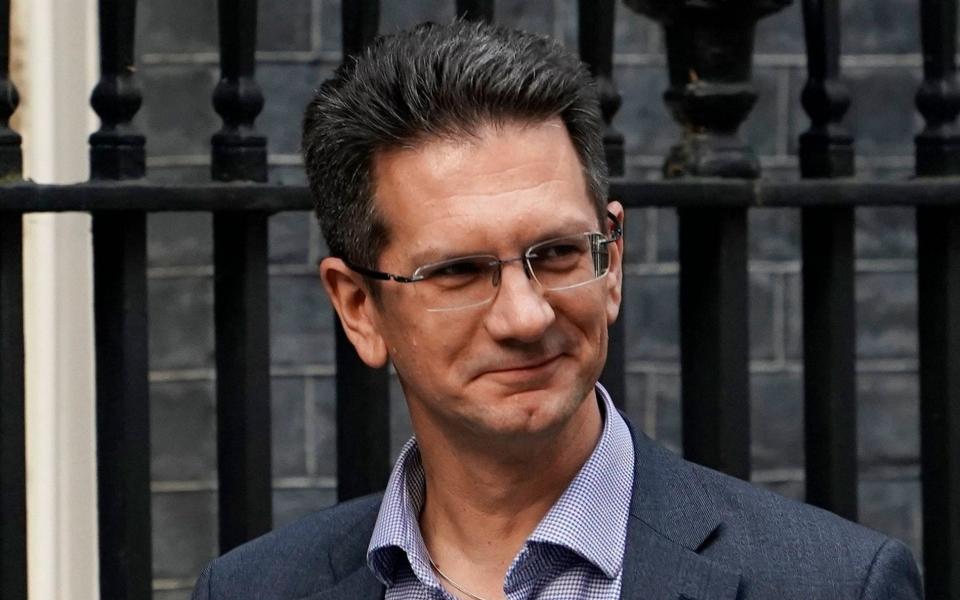Tory MPs want a pandemic equivalent of the European Research Group


Tory MPs are moving to set up the coronavirus equivalent of the European Research Group (ERG) if the Government fails to come up with a “plan B” to tackle the pandemic.
Steve Baker, a former chair of the ERG, which led the Brexit backbench rebellions, is being urged by as many as 90 Tory MPs to adopt the same approach to put the case for an alternative strategy to perpetual lockdowns.
It is understood there are businesses and groups outside Parliament willing to fund a “proper operation” to act as a counterweight to the scientific and medical advisers seen as holding sway over large sections of the Government.
Prime Minister Boris Johnson (below), defended his coronavirus strategy last week:
The move comes ahead of a critical period when there will be a series of votes to confirm the most draconian Tier 3 lockdowns, which have to be reviewed every 28 days, and the results of stage three trials of a potential vaccine, due as early as next month.
“Sir Patrick Vallance, the chief scientific officer, has suggested the vaccine is not going to be ‘completely sterilising', which means the virus is going to be endemic and we are going to have to live with it,” said one source.
“Everything is therefore pointing in the same direction as these MPs have been pointing, which is that we need a Plan B.”
Supporters of a group said the Government has become too reactive in the pandemic rather than adopting a strategic approach that looks weeks and months ahead.
One senior Tory MP said: “It feels to all of us as if the public is in a different place and is starting to question the efficacy of lockdowns. They realise there are serious consequences to them. The Government seems to be behind the curve on all of that.
“Enormous damage is being done to people’s lives and economy which is becoming more apparent every day particularly in areas where there are Tier 3 lockdowns that are increasing in size all the time.
“It’s a question of where the opportunity arises and when there will be votes or motions that come up in Parliament for us, there will be ways of demonstrating the strength of opinion.”
Tory MPs fired a warning shot earlier this month when 42 voted against stricter Covid-19 curbs. In total, 82 MPs including 23 Labour and 10 Lib Dems voted against the motion containing the 10pm hospitality curfew, as well as other restrictions on public spaces and fines.
Chris Green, a junior frontbencher and former member of ERG, resigned from the Government ahead of the vote in protest at the restrictions in his Bolton constituency.
Asked about the proposals, Mr Baker said: “I do not want to return to leading a party within a party in pursuit of a different policy. It’s not good for our country, the Government or the Conservative Party.
“With Sir Patrick Vallance’s recent evidence making it clear to me that we need a new strategy, I really hope the Government gets on the front foot as we approach the phase three vaccine trial results because the alternative is increasingly grumpy and restive members of Parliament as their voters pay the price of lockdown.”
See Prof Chris Whitty's assessment of Tier 3 lockdowns, below:
A paper prepared for the 90-strong group of MPs and seen by The Telegraph warned that even if a vaccine was found, the costs of the current strategy were too great to continue with it through the months it would take to vaccinate the population.
It argued that to save the most lives from all causes (not just Covid-19) measures were needed to take account of their non-Covid-19 harms with the evidence made public. It cited the 986,000 women who had missed mammograms and the recent record 114,000 quarterly increase in reducancies.
The paper claimed it was “false” to claim there were only two strategies for responding to the outbreak: suppression until a vaccine or allowing the virus to rip through the population.
It cited the Swedish model of much better protection of the vulnerable, especially in care homes, social distancing, reducing social contacts, limiting use of public transport, home working, closing universities, table-service only in restaurants, and limiting gatherings to 50 people.
It recommended the Government should immediately bring together doctors, scientists and economists to conduct a comprehensive cost-benefit analysis of four proposed strategies.
These included herd immunity/focused protection, further suppression, the current tiering system with targeted restrictions, and an Swedish-style model.

